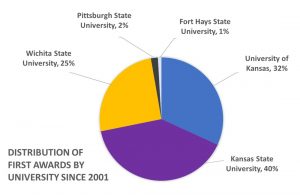This April, Kansas NSF EPSCoR announced its 2022 First Award winners: Assistant Professors Tania Kim and Zak Ratajczak. Both work at Kansas State University, conducting research related to the microbiomes of aquatic, plant, and soil systems in Kansas as described below.
Since it takes time to build effective grant writing skills, Kansas NSF EPSCoR uses First Awards to help early career faculty navigate the process. Each submission is reviewed by experts in the field, who offer feedback on how to make a compelling research proposal and compete nationally for funding.
These seed grants are designed to help assistant professors initiate novel research projects. With up to $100,000 for each award, young faculty can, for example, purchase key laboratory equipment, travel to scientific conferences, and support student researchers.

Kansas NSF EPSCoR has invested in more than 110 assistant professors since 2001 with its First Award program, which is funded by the National Science Foundation and the State of Kansas. These faculty hail from five universities across the state. Many award recipients have gone on to win prestigious federal grants and achieve national recognition—two key metrics of the program’s success.

2022 First Award Winner Tania Kim
Tania Kim is an assistant professor of entomology at K-State. Her research focuses on plant-insect interactions in human-modified landscapes. Tania is using her First Award funding to better understand the linkages between grasshoppers, plants, and soil microbiomes at the Konza Prairie Biological Station. Her project seeks to assess the microbial inhabitants in the guts of grasshoppers collected from cattle-grazed fields, bison-grazed fields, ungrazed watersheds, and a controlled greenhouse experiment. Her research is important since highly mobile insects like grasshoppers help spread microbes across the landscape. The results will strengthen her efforts at competing nationally for a larger National Science Foundation grant to further study how grasshoppers serve as a vector for certain microbes and how this might impact the environment.
Broader Impacts: Tania’s First Award is more than just research. She will also employ undergraduate students for a summer research fellowship as well as a graduate research assistant. Furthermore, data from her project will be used in a course next fall, giving K-State students practice organizing, analyzing, and visualizing the complexity of real-world datasets.
https://entomology.k-state.edu/people/faculty/Kim-Tania.html

2022 First Award Winner Zak Ratajczak
Zak Ratajczak is an assistant professor of biology at K-State. His research focuses on how plant communities respond to changes in climate and land management. Zak is using his First Award to analyze microbiomes and plant communities in bison wallows (bare earth depressions) at Konza Prairie Biological Station and contrast them with microbiomes from terrestrial and other aquatic areas. Since bison were reintroduced to this area thirty years ago, they have created over 10,000 wallows, leading to a complex landscape of aquatic habitats with unique biochemistry and hydrology that might support rare microbes and plants. Since there are no published studies on wallow microbiomes, his work will reveal how bison affect microbiome diversity of the tallgrass prairie. It will also lay the groundwork for Zak to compete for a larger National Science Foundation grant to assess how resilient grassland microbiomes are to extreme droughts.
Broader impacts: Zak will support one graduate student and two undergraduates each year, with an emphasis on recruiting students from groups typically underrepresented in the sciences.
https://www.k-state.edu/biology/about/people/faculty/ratajczak/
